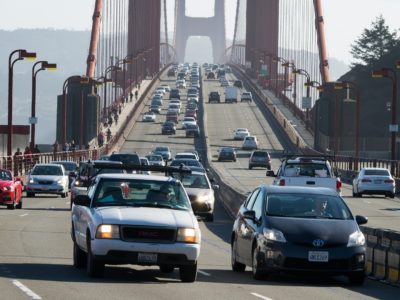Animal Cruelty and Interstate Commerce
A sleeper Supreme Court case could impact state climate legislation.
A month from now, the Supreme Court will hear a case about an animal cruelty law. It’s not an environmental law case, but the ruling could impact the authority of states to address climate change. Odds are that its impact will be limited, but you can never be sure of what five Justices might decide to do on any given day. Cases involving issues like this one are hard to predict because they tend to scramble the usual ideological alliances.
National Pork Producers v. Ross involves Prop 12, adopted by California voters in 2018. It contains a number of restrictions on factory farming. One of the restrictions bans the sale of pork in the state if the sows “lacked sufficient space to lie down, stand up, fully extend their limbs, or turn around freely.” Specifically, the sows must have at least 24 square feet of floor space — not that much considering that the average sow is about six feet long and three feet wide (taking up 18 of those square feet). Meat from the sow or her offspring can’t be sold in California if this requirement isn’t met.
The problem is that almost all of the pork sold in California comes from out of state. Virtually none of the industry would meet California’s seemingly modest requirements. Apparently, typical confinements areas for breeding are pretty much like the “tiger cages” the North Vietnamese used to punish U.S. prisoners of war. (Sorry, I’m trying to keep this post purely descriptive but that slipped in.) Anyway, the question is whether the California ban violates the rights of the pork producers to engage in interstate commerce.
The pork producers have two legal theories. One involves the so-called extraterritoriality doctrine. The basic idea is that states can’t adopt rules that have the practical effect of regulating outside their borders. The problem is drawing a line, since many laws by a state as big as California have economic impacts elsewhere. The other involves what’s called the Pike balancing test, which says a state law is invalid if its impact on interstate commerce clearly outweighs the benefits of the law.
The Ninth Circuit rejected both claims in long but not very transparent opinion. It rejected the extraterritoriality claim because the law related to sales within the state, applied equally to all producers wherever they were located, and banned only one profitable method of operation rather than interfering with the flow of commerce directly. Regarding the balancing test, it concluded that “these alleged cost increases to market participants and customers do not qualify as a substantial burden to interstate commerce for purposes of the dormant Commerce Clause.”
Here are the key things experts will be watching for in this case:
- Some lower courts have said “extraterritoriality” isn’t the basis for a separate test; it’s just a factor in applying other tests such as the Pike balancing test. Will the Supreme Court keep it as a standalone legal theory?
- If it keeps extraterritoriality as a standalone doctrine, how will the Court define extraterritoriality? Lower courts are all over the map on this one.
- Once a law is classified as extraterritorial, is there any possible defense? Or is getting that label “game over.”
- Will the change or even reject the Pike balancing test? Some Justices, notably Thomas and Scalia, rejected the legitimacy of this test in prior cases. Will any of the newer Justices adopt this view?
If the state loses on the basis of the Pike issue, that probably won’t mean much because the application of the balancing test is very specific to the facts of each case. A ruling on extraterritoriality could be much more significant. Many state climate change regulations have impacts on other states. For example, the Ninth Circuit upheld California’s Low Carbon Fuel Standard against a similar legal attack. Like some other states, California also imposes limits on utility purchases of power from fossil fuel plants that apply to generators outside the state. Depending on how broadly the Court defines extraterritoriality, these and other environmental regulations could be at risk.
The National Pork Producers has some special features. The national pork market apparently has some special features that make it impossible for a producer to know where their product ends up. That’s true from a physicist’s view about electricity, but regulations are based on identifiable market transactions rather than the actual flow of electrons. Also, unlike carbon emissions from out of state, out-of-state farming practices don’t cause any harm to people here.
Thus, it may turn out this ruling doesn’t have many broader implications. A broad definition of extraterritoriality, however, could really upset the applecart. Not to mention how the Court’s ruling will affect the welfare of the hapless animals who are the subject of the dispute.
Reader Comments
5 Replies to “Animal Cruelty and Interstate Commerce”
Comments are closed.







Dan, what did UC do to prevent this!?:
‘Clairvoyant’ 2012 climate report warned of extreme weather
By SETH BORENSTEIN
https://apnews.com/article/science-africa-droughts-2e6d7b1a63b11b6b7c14e8fb92f23341
Dirks partly explained the cultural failure that enabled the environmental disaster threats we are experiencing today, in the Summer 2013 CALIFORNIA Magazine issue:
— academics characterized themselves as pure. And he noted that one of the reasons, perhaps, why there were so few public intellectuals of note in America is not just because America is anti-intellectual—which of course it is—but also because so many intellectuals don’t want to take on the sort of complications and impurities that come with being public.”— “I also have to be mindful of the current challenges to higher education, which don’t allow complacency. So purity goes along with complacency, in a way, and also goes along with a certain willful ignorance of the political and economic conditions that surround them.”
https://alumni.berkeley.edu/california-magazine/summer-2013-a-new-deal/administering-change/
We must immediately implement your recommendation based upon your statement:
“Where Berkeley falls short, in my view, is that there’s little leadership from the top and little structure at the campus level to organize climate efforts.”
Hopefully, for the sake of our newest generations, we still have time left.
Dan, as you know quite well, the Durants concluded, after 40 years of historical research and documentation, that when civilizations fail it is because political or intellectual leaders fail to meet the challenges of change.
Today, both our political and intellectual leaders have failed to meet the challenges of global warming so climate changes are totally out of control.
Do you think you can find a way to make complacent UC leaders implement your leadership and structure recommendation in time?
Thank you for this summary. I would disagree with your assertion that the way pork is raised in other states does not affect Californians. Gestation crate systems require constant infusion of antibiotics, causing antibiotic resistance, while the high density of animals facilitates the mutation of viral pathogens that can be transferred to humans.
Climate impacts are heading into ‘uncharted territory of destruction’
https://www.msn.com/en-us/weather/topstories/climate-impacts-are-heading-into-uncharted-territory-of-destruction/ar-AA11Mmpv?ocid=msedgdhphdr&cvid=fb1e64033eae4ecda903da23c48d2827